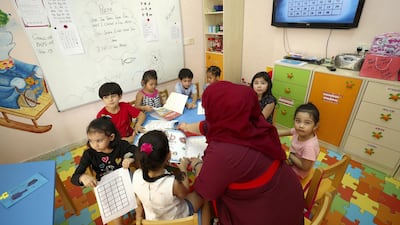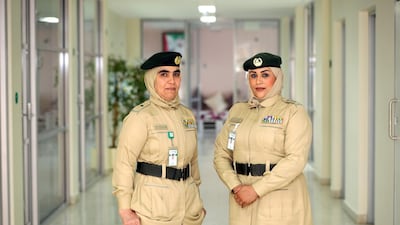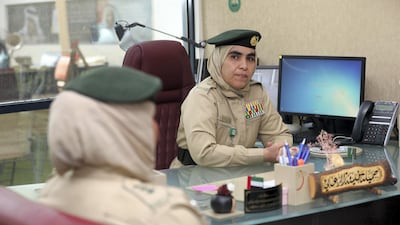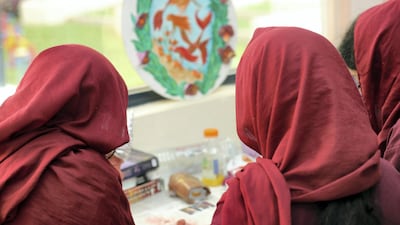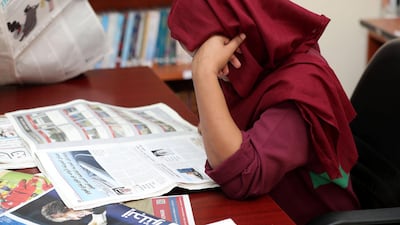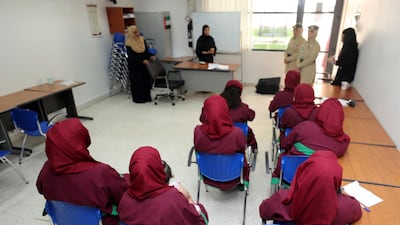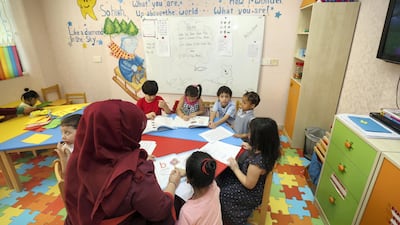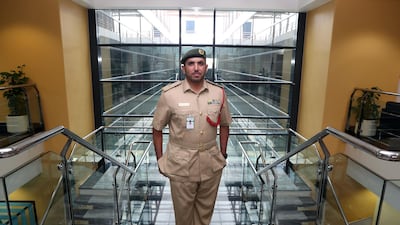At first glance, the women inmates in the exercise areas of the female prison at Dubai Central Jail are identifiable only by the colour of their clothing.
The 470 prisoners appear in a sea of red and pink uniforms – those in pink are serving shorter terms than those in red, the latter having committed more serious offences.
It is another way to easily label and categorise the inmates – but the isolated cry of a child is a stark reminder that many of these women are more than just prisoners, more than numbers in the ranks of the incarcerated, they are mothers.
Among the hundreds of prisoners is one wearing a red uniform, her hair covered with a black scarf, carrying a crying baby. He is one of 74 children who live with their mothers
in jail.
Many of these children call the prison home. Some have lived there since they were born.
The prison administration will transfer these children to a nursery equipped with special care providers at Dubai Central Jail in a matter of weeks.
The National was granted rare access to the facility in Al Awir, on the edge of the city, ahead of the opening of the new nursery, as wardens attempt to manage an increase in the number of children living in prison.
Perhaps even more so than their mothers, who have known a life away from prison walls and bars, the children will require specialist support to prepare them for life on the outside.
Away from the bustle of the city and in the middle of Al Awir desert, Dubai Central Jail is home to thousands of convicts. It’s like a residential compound, with each building designated to hold groups of prisoners or serve a specific purpose, such as serving visitors. Male and female prisoners are housed in separate buildings.
__________
Read more:
Young lives being destroyed by drugs, former addicts warn UAE
Revealed: What life is really like inside prison in Abu Dhabi
Drugs law changes shift focus to rehab rather than punishment
__________
It is not an ideal environment for a child to grow up in, but prison officials are taking steps to ensure youngsters can look forward to a brighter future.
Maj Aziza Ali Abdul Aziz, acting director of Dubai Female Prison, said the nursery will be ready in approximately three weeks.
“It is designed to protect children from a potentially harmful environment due to their stay with their mothers and other inmates in jail.
“The childcare facility will be supervised by a social specialist and psychological expert to rehabilitate the children and prepare them for life outside the jail.”
The nursery will also allow mothers to spend time with their children away from their usual environment.
Many have been imprisoned for living in the country illegally, having sex outside of marriage, theft or drug-related offences
“With the new move, mothers will spend specific designated hours with their children, not like before when children used to spend most of their time with their jailed mothers,” said Maj Abdul Aziz.
“Mothers of infants will go to the nursery to breastfeed their children and will be provided with the needed environment.”
Another officer, Capt Fatima Al Mazmi, said the number of children placed in jail with their mothers was on the increase, making provisions for childcare all the more crucial.
“In previous years, the number reached up to 45 children. It is 74 now. The children, all below the age of six, are mostly Filipino and African and a few are Arabs,” said Capt Al Mazmi.
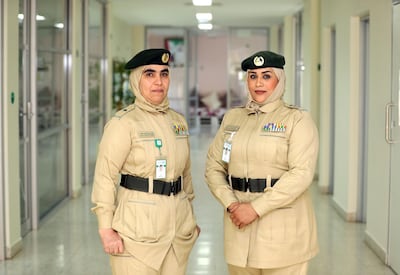
Issuing a birth certificate for children from unknown fathers was a difficult issue.
“A Kazakh mother claimed that the father of her child was a UAE citizen. The DNA has not proved her claims,” she said.
“The process includes a report of birth, sending a letter to the preventive medicine department and a DNA test to ensure the newborn’s lineage.”
Among the inmates is a Nigerian, 37, who has taken care of the daughter of a friend, who is also in jail. “I was charged with drugs smuggling and have been in jail for two years. Three more years to go to be set free,” she said.
The woman said a man in her home country gave her substances to bring into the UAE without her knowing they were prohibited in the country.
The tale is a familiar one, and heard often by judges in Dubai Criminal Court.
To the right of the women’s prison yard, inmates were standing in a queue waiting for their turn to buy items at a canteen. Along with exercise in the prison yard, lectures are also offered as an important step in their rehabilitation. Positive thinking and integration into the community again are common themes.
One prisoner raised her hand, reflecting on her time in prison. “We underestimated the small things in life,” she said.
Another woman, whose crime was not stated, said she “owned companies and used to live a lavish life” before prison.
“I could not accept being placed in jail and took time to adapt to the new situation,” she said. The time behind bars had “changed my perspective on life”, she said.
